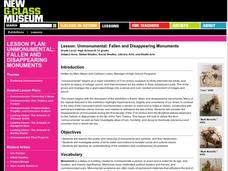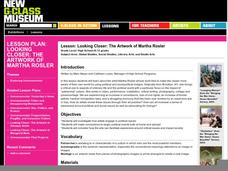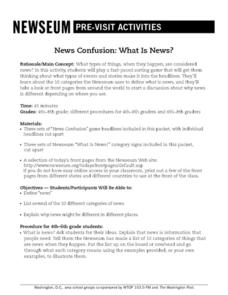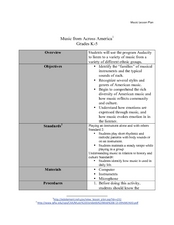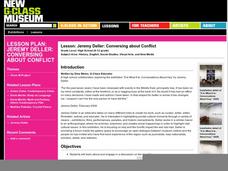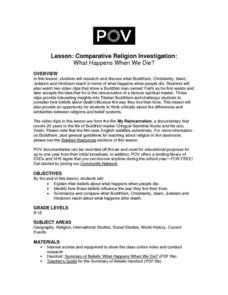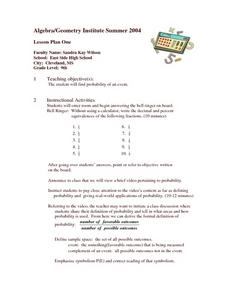State Bar of Texas
McCullough v. Maryland
Can a state government tax the federal government? The Supreme Court case McCullough v. Maryland explores different governments in the United States. Scholars research the court's decision with a video and discussion. They formulate...
Curated OER
Lesson: Tlatelolco: Mexican Student Massacre 1968
The Massacre of Tlatelolco is the focus of a discussion-based lesson. Civil-minded learners consider the nature of student movements that have ended in violence based on over-reaction and government oppression. They discuss the social...
New Museum of Contemporary Art
Lesson: Unmonumental: Fallen and Disappearing Monuments
Due to vandalism, war, and urban decay, many of the world's great monuments have fallen to ruin. Here is an interesting lesson plan that increases understanding of the dichotomy between what are intended as lasting tributes, and their...
Civil War Trust
Genealogy
The Civil War is undoubtedly a part of America's history, but could it be part of your pupils' history as well? Middle schoolers conduct research to discover a connection between their ancestors and the American Civil War. Whether they...
American Chemical Society
The Discovery of Fullerenes
Carbon is the most common element on earth, so the innovative discovery of a new type of carbon molecule won the 1996 Nobel Prize. In the ready-to-go lesson, scholars learn about C60 and how it has opened up the entire area of...
American Chemical Society
Joseph Priestley, Discoverer of Oxygen
Do you want to hear a joke about nitrogen and oxygen? NO. We all know there is oxygen in the air and that plants produce oxygen, but how was it discovered? Scholars read a handout, answer questions, and analyze material in the...
Curated OER
Lesson: Lisa Signal: Altering Perspectives
Kids make big artistic gestures, just like the abstract artist, Lisa Signal. They use her work as inspiration for making simplistic, abstract, statements in an artistic way. They analyze her work, then walk through an unfamiliar...
Curated OER
Lesson: Looking Closer: The Artwork of Martha Rosler
Have a class discussion to better understand the art of Martha Rosler. Young art critics consider Martha's art as it is used to express issues of political unrest and social awareness. They look at each of the five images and use the...
Curated OER
Story of Self
What a great beginning-of-the-year activity! Get your class to identify their values through a three-page worksheet (included). Each speaker will craft a two-minute description that includes their story and how they can help their...
Newseum
News Confusion: What Is News?
Use headlines to help your learners understand what news is. First, present a list of categories to your class. Then instruct small groups to play a game in which they sort headlines into the categories. Discuss the result and examine...
Bright Hub Education
Using Evidence and Supporting Details in Writing
In expository writing, it is important to back up claims with evidence and details. Help your class to develop their writing with notes on different types of evidence. Once they have the basics down, practice with a sample thesis and...
Curated OER
Say Hi to Haibun Fun
Students examine the Japanese writing form of Haibun. They identify the elements of Japanese prose and poetry, analyze a haibun for writing devices, complete a graphic organizer, and compose an original haibun as a form of journal keeping.
Curated OER
Anishinabe - Ojibwe - Chippewa: Culture of an Indian Nation
Students investigate the American Indian tribe of the Chippewa. They identify the different names of the Anishinabe/Ojibwe/Chippewa nation, conduct a research project, explore various websites, and present their group research projects.
Curated OER
Music from Across America
Students complete a unit of lessons on a variety of types of American music. They record their impressions of music samples on a worksheet, identify types of instruments, and choose a musical selection for their family to respond to.
Curated OER
Lesson: After Nature: Visions and Visionaries
Build visual literacy, discussion, and critical thinking skills with an innovative art lesson. Young analysts discuss the use of decalcomania, surrealism, and automatism in various contemporary pieces, discuss constructed truth, and...
Curated OER
Lesson: Jeremy Deller: Conversing about Conflict
Bridge cultural awareness, community, government, and art with an introspective and thought-provoking lesson. Upper graders become globally and socially aware as they analyze and explore the art of Jeremy Deller. They consider his images...
Curated OER
Lesson: Urs Fischer: Reviving the Past Art Movements
Seven major abstract art movements are analyzed by learners in groups. Each group analyzes various works by determining which work belongs to which movement. They then read Flatland, engage in an art and literary analysis discussion,...
Curated OER
Write Some Dialogue
Learners write dialogue. For this character development instructional activity students use direct or indirect speech to include a confrontation between two characters in their story. Learners portray the emotions of the characters in...
Curated OER
Is Grandpa Right, Were Winters Colder When He Was a Boy?
Students compare current weather data to historic data to see if there is a temperature change. For this weather lesson students complete a lab activity and determine average changes in temperature, precipitation and cloud cover.
National Endowment for the Humanities
Revolution '67, Lesson 1: Protest: Why and How
To some people, protesting is as American as apple pie, but the factors that lead to protests can be as confusing to veteran activists as to today's youth. Revolution '67 explores the riots in Newark, New Jersey as a case study. Using...
Bright Hub Education
"A Long Way From Chicago": Character Descriptions
Complete studies of the memorable characters in Richard Peck's novel A Long Way from Chicago. The lesson describes three different activities to help your class better understand characters in the story, character development in general,...
American Documentary
Comparative Religion Investigation: What Happens When We Die?
How do different religions offer explanations for what happens when we die? Invite your learners to consider the variance and complexity of religious beliefs, and to research and compare/contrast the concept of death and afterlife...
Curated OER
Civil War Literature Circle
Historical fiction can be a valuable asset when learning about the past. Integrate several novels written about the Civil War into your social studies unit, with groups of four working collaboratively to comprehend the novel from...
Curated OER
Finding the Probability
Ninth graders investigate the concept of probability. They use a clear objective that is a visual cue for what is required for the lesson. They apply the basic practices of probability to real life like situations.




